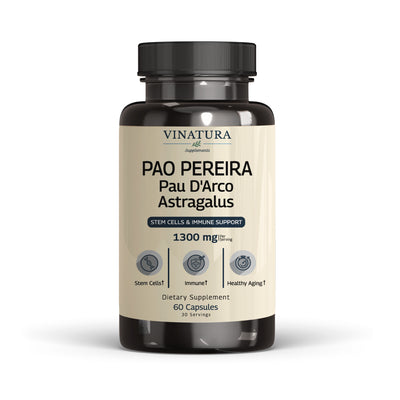
Berberine Vs. Omega-3: Which Is The Best Choice For Heart Health?
Omega-3 and berberine have long been known as excellent aids in improving heart health, protecting the heart, and enhancing heart functions. These two compounds are frequently mentioned in methods for combating cardiovascular diseases and damage. However, not everyone fully understands the functions and benefits of these two products. This article will compare these two supplements, helping you gain a clearer understanding of each and choose the best one for your health goals.
Before exploring further, please read the disclaimer located at the end of this webpage.
Key Takeaways
- Berberine is a natural compound derived from herbs, recognized for supporting balanced cholesterol and blood sugar levels.
- Omega-3 is a group of essential fatty acids that help reduce inflammation and support heart health.
- Both berberine and omega-3 are beneficial for heart health, but each has distinct effects.
- You might consider using both to enhance heart health.
About Berberine
What Is Berberine?
Berberine is a chemical compound extracted from several well-known herbs such as barberry, goldthread, and tree turmeric. It has been used in traditional East Asian medicine, particularly in China and India, for thousands of years. Berberine is renowned for its ability to regulate blood sugar, reduce inflammation, and protect the cardiovascular system from common heart diseases.
Read more: Berberine Vs Milk Thistle: Which Is Better For Liver and Metabolic Support?
Berberine Benefits
One of the standout benefits of berberine is its role in addressing cardiovascular issues, particularly diabetes. In the short term, berberine slows the absorption of carbohydrates within a few hours, helping stabilize insulin and promote efficient regulation of blood sugar levels.
This aids individuals with cardiovascular problems such as diabetes, hyperglycemia, or even high blood pressure. [1] Studies have also shown that berberine reduces cholesterol and triglyceride levels, reducing heart diseases like atherosclerosis and clogged arteries. [2]
Several Amazon users who have tried supplements containing Berberine have reported noticeable improvements. One user, MomMartin, shared her experience:
“It’s amazing—I’ve genuinely felt a difference thanks to the benefits of this supplement.”*
About Omega 3

What Is Omega 3?
Omega-3 is a polyunsaturated fatty acid with health-supportive properties, comprising three main types: ALA (alpha-linolenic acid), EPA (eicosapentaenoic acid), and DHA (docosahexaenoic acid). [3] ALA is found in plant sources like flaxseed and walnuts, while EPA and DHA are present in seafood sources like fish oil.
The primary function of omega-3 is to reduce inflammation, improve heart health by lowering triglycerides in the blood, alleviate neurodegenerative symptoms, enhance vision, and provide other health benefits.
Omega 3 Benefits
A scientific report investigating omega-3’s effects on health and disease management states: “...omega-3 fatty acid-enriched fish oil (FO) and/or omega-3 precursors from certain vegetable oils (linolenic acid omega-3) are found to provide protection against cardiovascular disease, rheumatoid arthritis, cancer, and possibly against the severity of viral infections.” [4]
More specifically, studies show that omega-3 can support balanced lipid levels in the blood, contributing to overall cardiovascular wellness. [5] Additionally, omega-3 has shown the potential to reduce the risk of neurological conditions like Alzheimer’s, dementia, depression, visual impairment, and inflammatory diseases. [6] Therefore, omega-3’s effects are highly beneficial to overall human health.
You may also read: Ashwagandha Vs Berberine: Which Is Better?
Berberine Vs. Omega-3: A Comparative Table:
|
Factor |
Berberine |
Omega-3 |
|
Source |
Herbal |
Polyunsaturated fatty acid |
|
Primary Function |
Regulates cholesterol and blood sugar |
Reduces inflammation, protects arteries |
|
Additional Benefits |
Supports lipid regulation, reduces inflammation |
Lowers triglycerides, reduces blood pressure |
|
Anti-Inflammatory |
Good |
Very strong |
|
Blood Pressure Reduction |
Good |
Very strong |
|
Drug Interactions |
Possible, consult a healthcare professional |
Few side effects |
Berberine Vs. Omega-3: Which One Should You Choose For Heart Health?

The choice between berberine and omega-3 largely depends on your personal health goals and condition. Specifically:
- If you are seeking a supplement to regulate blood sugar and cholesterol levels, berberine could be an effective and optimal choice.
- Meanwhile, omega-3, in addition to its anti-inflammatory properties, is highly beneficial for improving arterial health, regulating heart rhythms, and lowering triglycerides in the body.
However, you can combine the use of both products to achieve more comprehensive heart health benefits, as these two supplements work through different mechanisms and do not interact negatively to cause side effects.
Can You Take Berberine And Omega 3 Together?
As mentioned earlier, you can combine products that contain both berberine and omega-3 without worrying about side effects or reduced effectiveness. Additionally, if you are concerned, you can consult a healthcare professional to receive appropriate advice on the correct dosage and proportion of these two compounds.
Things To Know When Using Berberine And Omega-3 For Heart Health
Before using these supplements, here are a few essential factors to consider for safe use:
- Dosage: Use the appropriate dosage, following the manufacturer’s or a healthcare professional’s guidance to maximize benefits while avoiding the consequences of overdosing.
- Timing of Use: Berberine works best when taken before meals, while omega-3 can be taken at any time of the day.
- Monitor Body Reactions: This will help you respond to any potential side effects or unwanted interactions within the body.
- Side effects: associated with using berberine can include digestive discomfort such as bloating, indigestion, constipation, etc. or can interact with certain medications. Therefore, be very careful during use!
Conclusion
Both berberine and omega-3 are excellent choices for supporting heart health, but each has distinct benefits and different mechanisms of action within the body. If you are considering using either or both, carefully evaluate your personal needs and current health conditions, and consult with healthcare professionals to achieve optimal results while avoiding any unwanted side effects.
References
- [1] ---. “Protective Effect of Berberine on Beta Cells in Streptozotocin- and High-carbohydrate/High-fat Diet-induced Diabetic Rats.” European Journal of Pharmacology, vol. 606, no. 1–3, Jan. 2009, pp. 262–68. https://doi.org/10.1016/j.ejphar.2008.12.056.
- [2] Kong, W., Wei, J., Abidi, P. et al. Berberine is a novel cholesterol-lowering drug working through a unique mechanism distinct from statins. Nat Med 10, 1344–1351 (2004). https://doi.org/10.1038/nm1135
- [3] "Omega−3 Fatty Acids". Office of Dietary Supplements, US National Institutes of Health. 26 March 2021. Archived from the original on 8 December 2016. Retrieved 10 June 2021.
- [4] Fernandes, Gabriel, and Jaya T. Venkatraman. “Role of Omega-3 Fatty Acids in Health and Disease.” Nutrition Research, vol. 13, Jan. 1993, pp. S19–45. https://doi.org/10.1016/s0271-5317(05)80282-9.
- [5] Yashodhara, B. M., et al. “Omega-3 Fatty Acids: A Comprehensive Review of Their Role in Health and Disease.” Postgraduate Medical Journal, vol. 85, no. 1000, Feb. 2009, pp. 84–90. https://doi.org/10.1136/pgmj.2008.073338.
- [6] Shahidi, Fereidoon, and Priyatharini Ambigaipalan. “Omega-3 Polyunsaturated Fatty Acids and Their Health Benefits.” Annual Review of Food Science and Technology, vol. 9, no. 1, Mar. 2018, pp. 345–81. https://doi.org/10.1146/annurev-food-111317-095850.
Testimonial Disclaimer
*The testimonials presented on this website are provided by individuals based on their personal experiences with our products. These testimonials represent individual opinions and experiences, which may not be typical or applicable to all users of our products. Results may vary depending on a variety of factors, including individual health, lifestyle, and adherence to product usage instructions.Author

Product Disclaimer
Including an ingredient or study does not evaluate, endorse, or recommend any Vinatura product or any third-party product. Some ingredients discussed may not be used in any Vinatura product.
The content of the articles has not been evaluated by the Food and Drug Administration (FDA) and is not intended to promote or endorse any specific product. Any products sold on this website are not intended to diagnose, treat, cure, or prevent any disease.
Opinions and Endorsements
Any claims, statements, or opinions expressed in the articles are those of the author(s) and do not necessarily reflect the views or opinions of the manufacturers of the dietary supplement products. The products sold on this website are separate from the content of the articles and are not directly endorsed or associated with the information presented here.
Liability Disclaimer
The author(s) of the articles, website, and manufacturers of the dietary supplement products do not assume any liability for any potential consequences arising from the use of the information provided in the articles. Ingredient effects, dosages, and safety vary by individual, formulation, and context; some ingredients interact with medications or may be unsuitable during pregnancy or lactation. It is recommended that individuals consult with a qualified healthcare professional before making any dietary or lifestyle changes, including the use of dietary supplements.
Product Usage
Please refer to the product labels and packaging for specific usage instructions and guidelines for the dietary supplement products sold on this website.
Customer Support
For any concerns or questions regarding the dietary supplement products, please contact our customer support team, who will be more than happy to assist you.





Leave a Comment
Be the first to comment.
What do you think?